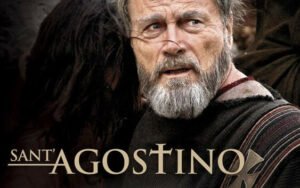Sant’Agostino
An elaboration of Augustine’s life, revealing not only the life of Augustine himself, but also the heroic struggle of Saint Monica, Augustine’s mother, who, despite great abuse and humiliation by her husband and later by her son Augustine, did not lose her faith in God and love. Thanks to her perseverance in prayer for several years, she was able, with God’s help, to save both husband and son for heaven.
Augustine grows up in a family where his father is an alcoholic and gambling addict and cheats on his wife with other men. The influence of such an environment results in Augustine’s equally selfish attitude toward life.
In adulthood, Augustine embarks on a career as an orator and lawyer. His teacher is the renowned Macrobius in Carthage. Unfortunately he does not teach honesty, integrity and the search for truth in legal disputes, but how to always achieve one’s own benefit and goal through lies.
He begins to live a dissolute lifestyle, but it does not satisfy him. He sees how much evil his sophisticated deceptions bring. The teacher has led him to relativize the truth, but this false teaching causes more and more struggle in Augustine.
Despite his personal struggles, he falls deeper and deeper into the mire of sin. He begins to live with his maid, has an illegitimate son, joins the sect of the Manichaeans, mocks Christians. Eventually, he abandons both his maid and his son. He begins to work with Valerius, who helps him to become the emperor’s spokesman. On behalf of the emperor, he fights in debates against Bishop Ambrose and against the Christians in Milan.
The philosophical and theological debates with Ambrose in him, however, reinforce the need to follow the Truth. When he finally opens up to Christ, God changes his life 180 degrees. A new Augustine arrives on the scene. Not a degenerate coward and a minion of Caesar, but a courageous man who wants to fill his life with love for God and people.
Parents Guide: The nudity in the scene during the shots of the revelers, and also the provocatively dressed and behaving women in some of the other scenes. The dialogues with Bishop Ambrose, especially some of his statements, are less well handled. The weeping of Augustine’s son comes across as somewhat inauthentic.
Several violent scenes.
Cast: Alessandro Preziosi, Cesare Bocci, Monica Guerritore, Cosimo Fusco, Jannis Niewöhner, Götz Otto, Franco Nero, Johannes Brandrup, Gerald Alexander Held
Crew: Christian Duguay
Italy, 2010
It is beneficial to support valuable art by buying it. Supporting good cinema not only helps the creation of quality films, but it is also a sign of honesty and decency towards the filmmakers.



There are no reviews yet.